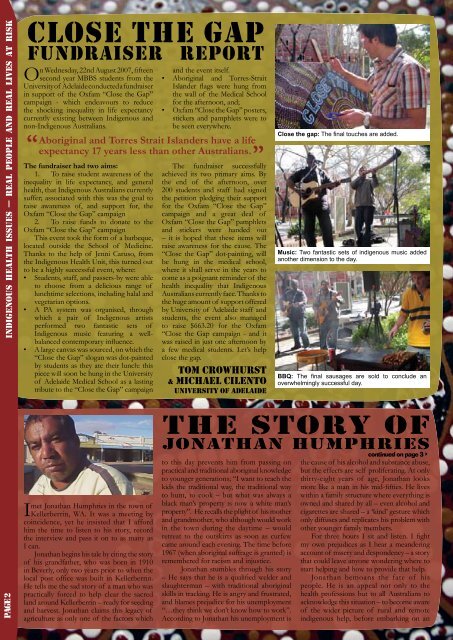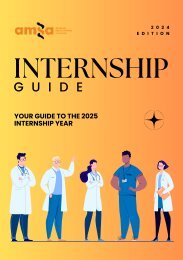Vector Issue 5 - 2007
You also want an ePaper? Increase the reach of your titles
YUMPU automatically turns print PDFs into web optimized ePapers that Google loves.
indigenous health issues — real people and real lives at risk<br />
close the gap<br />
fundraiser report<br />
On Wednesday, 22nd August <strong>2007</strong>, fifteen<br />
second year MBBS students from the<br />
University of Adelaide conducted a fundraiser<br />
in support of the Oxfam “Close the Gap”<br />
campaign - which endeavours to reduce<br />
the shocking inequality in life expectancy<br />
currently existing between Indigenous and<br />
non-Indigenous Australians.<br />
The fundraiser had two aims:<br />
1. To raise student awareness of the<br />
inequality in life expectancy, and general<br />
health, that Indigenous Australians currently<br />
suffer; associated with this was the goal to<br />
raise awareness of, and support for, the<br />
Oxfam “Close the Gap” campaign<br />
2. To raise funds to donate to the<br />
Oxfam “Close the Gap” campaign<br />
This event took the form of a barbeque,<br />
located outside the School of Medicine.<br />
Thanks to the help of Jenni Caruso, from<br />
the Indigenous Health Unit, this turned out<br />
to be a highly successful event, where:<br />
• Students, staff, and passers-by were able<br />
to choose from a delicious range of<br />
lunchtime selections, including halal and<br />
vegetarian options.<br />
• A PA system was organised, through<br />
which a pair of Indigenous artists<br />
performed two fantastic sets of<br />
Indigenous music featuring a wellbalanced<br />
contemporary influence.<br />
• A large canvas was sourced, on which the<br />
“Close the Gap” slogan was dot-painted<br />
by students as they ate their lunch: this<br />
piece will soon be hung in the University<br />
of Adelaide Medical School as a lasting<br />
tribute to the “Close the Gap” campaign<br />
and the event itself.<br />
• Aboriginal and Torres-Strait<br />
Islander flags were hung from<br />
the wall of the Medical School<br />
for the afternoon, and;<br />
• Oxfam “Close the Gap” posters,<br />
stickers and pamphlets were to<br />
be seen everywhere.<br />
Aboriginal and Torres Strait Islanders have a life<br />
expectancy 17 years less than other Australians.<br />
The fundraiser successfully<br />
achieved its two primary aims. By<br />
the end of the afternoon, over<br />
200 students and staff had signed<br />
the petition pledging their support<br />
for the Oxfam “Close the Gap”<br />
campaign and a great deal of<br />
Oxfam “Close the Gap” pamphlets<br />
and stickers were handed out<br />
– it is hoped that these items will<br />
raise awareness for the cause. The<br />
“Close the Gap” dot-painting, will<br />
be hung in the medical school,<br />
where it shall serve in the years to<br />
come as a poignant reminder of the<br />
health inequality that Indigenous<br />
Australians currently face. Thanks to<br />
the huge amount of support offered<br />
by University of Adelaide staff and<br />
students, the event also managed<br />
to raise $663.20 for the Oxfam<br />
“Close the Gap campaign - and it<br />
was raised in just one afternoon by<br />
a few medical students. Let’s help<br />
close the gap.<br />
tom crowhurst<br />
& michael cilento<br />
university of adelaide<br />
Close the gap: The fi nal touches are added.<br />
Music: Two fantastic sets of indigenous music added<br />
another dimension to the day.<br />
BBQ: The fi nal sausages are sold to conclude an<br />
overwhelmingly successful day.<br />
page 2<br />
met Jonathan Humphries in the town of<br />
I Kellerberrin, WA. It was a meeting by<br />
coincidence, yet he insisted that I afford<br />
him the time to listen to his story, record<br />
the interview and pass it on to as many as<br />
I can.<br />
Jonathan begins his tale by citing the story<br />
of his grandfather, who was born in 1910<br />
in Beverly, only two years prior to when the<br />
local post office was built in Kellerberrin.<br />
He tells me the sad story of a man who was<br />
practically forced to help clear the sacred<br />
land around Kellerberrin – ready for seeding<br />
and harvest. Jonathan claims this legacy of<br />
agriculture as only one of the factors which<br />
the story of<br />
jonathan humphries<br />
to this day prevents him from passing on<br />
practical and traditional aboriginal knowledge<br />
to younger generations; “I want to teach the<br />
kids the traditional way, the traditional way<br />
to hunt, to cook – but what was always a<br />
black man’s property is now a white man’s<br />
property”. He recalls the plight of his mother<br />
and grandmother, who although would work<br />
in the town during the daytime – would<br />
retreat to the outskirts as soon as curfew<br />
came around each evening. The time before<br />
1967 (when aboriginal suffrage is granted) is<br />
remembered for racism and injustice.<br />
Jonathan stumbles through his story<br />
– He says that he is a qualified welder and<br />
slaughterman – with traditional aboriginal<br />
skills in tracking. He is angry and frustrated,<br />
and blames prejudice for his unemployment<br />
“…they think we don’t know how to work”.<br />
According to Jonathan his unemployment is<br />
continued on page 3<br />
the cause of his alcohol and substance abuse,<br />
but the effects are self proliferating. At only<br />
thirty-eight years of age, Jonathan looks<br />
more like a man in his mid-fifties. He lives<br />
within a family structure where everything is<br />
owned and shared by all – even alcohol and<br />
cigarettes are shared – a ‘kind’ gesture which<br />
only diffuses and replicates his problem with<br />
other younger family members.<br />
For three hours I sit and listen. I fight<br />
my own prejudices as I hear a meandering<br />
account of misery and despondency – a story<br />
that could leave anyone wondering where to<br />
start helping and how to provide that help.<br />
Jonathan bemoans the fate of his<br />
people. He is an appeal not only to the<br />
health professions but to all Australians to<br />
acknowledge this situation – to become aware<br />
of the wider picture of rural and remote<br />
indigenous help, before embarking on an
















